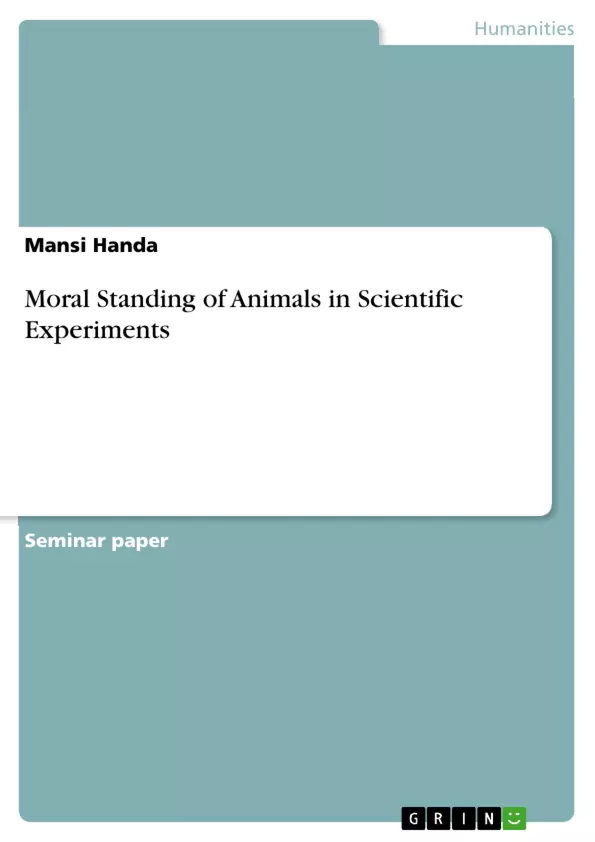When moral justification of the use of animals in the area of scientific experimentation is well thought-out, we rely on the principles of moral standing suggested by various philosophers. Philosophers try to find out whether animals count or whether animals can be brought under moral consideration. If they cannot be brought under the moral purview, then probably one cannot find any reason that it is morally wrong to use animals for human good, such as using them in painful scientific experiments. This paper brings out some of the principles suggested by philosophers in order for an agent to be considered morally. Further this paper suggests that most of these views do not provide a basis to include animals under the moral purview. Thereby, I put forward a perspective called the ‘common sense view’ to bring animals under the moral consideration which further implies that the use of animals in the area of scientific experimentation is morally unjustified.
Inhaltsverzeichnis (Table of Contents)
- Introduction
- Moral Standing: General Remarks
- Philosophers on Moral Standing
- Rationality
- Sentience as a Basis of Moral Standing
Zielsetzung und Themenschwerpunkte (Objectives and Key Themes)
This paper examines the moral justification of using animals in scientific experiments. It explores philosophical viewpoints on moral standing, particularly the roles of rationality and sentience in determining whether animals deserve moral consideration. The paper ultimately argues against the moral justification of animal experimentation.
- Moral standing of animals
- The role of rationality in moral consideration
- Sentience as a basis for moral standing
- Critique of philosophical perspectives on animal rights
- A "common sense view" on animal welfare in experimentation
Zusammenfassung der Kapitel (Chapter Summaries)
Introduction: This chapter introduces the widespread use of animals in scientific experiments, highlighting the ethical concerns raised by the pain and suffering inflicted upon them. It establishes the central ethical question: Is it morally justifiable to conduct experiments on animals for human benefit? The chapter emphasizes the importance of understanding moral standing – the criteria for determining which beings deserve moral consideration – as the foundation for addressing this question. It previews the contrasting philosophical viewpoints on animal moral standing and the author's intention to analyze these perspectives.
Moral Standing: General Remarks: This section defines moral standing, clarifying what it means for a being to have it. It presents definitions from different ethicists, such as Andre and Velasquez, who highlight the importance of considering an individual's well-being for its own sake, and Shafer-Landau, who emphasizes a being's intrinsic moral importance. The section explains that moral standing may or may not imply rights, and that moral agents have duties towards beings with moral standing. It sets the stage for the examination of different philosophical criteria for moral standing.
Philosophers on Moral Standing: This chapter explores various philosophical viewpoints on moral standing, focusing on the criteria of rationality and sentience. It analyzes the arguments of philosophers such as Aristotle and Kant, who emphasize rationality as a necessary condition for moral standing, thus potentially excluding animals. The chapter also discusses the utilitarian perspective of Bentham, Mill, and Singer, who argue that sentience – the capacity to feel pleasure and pain – is the crucial factor in determining moral standing, thereby extending moral consideration to animals.
Schlüsselwörter (Keywords)
Animals, Moral standing, Moral consideration, Scientific experiments, Rationality, Sentience, Speciesism, Utilitarianism, Moral justification
Frequently Asked Questions: A Comprehensive Language Preview on the Moral Justification of Animal Experimentation
What is the main topic of this paper?
This paper examines the moral justification of using animals in scientific experiments. It explores different philosophical viewpoints on moral standing, focusing on rationality and sentience as criteria for determining whether animals deserve moral consideration. The paper ultimately argues against the moral justification of animal experimentation.
What are the key themes explored in this paper?
Key themes include the moral standing of animals, the role of rationality in moral consideration, sentience as a basis for moral standing, a critique of philosophical perspectives on animal rights, and a "common sense view" on animal welfare in experimentation.
What is meant by "moral standing"?
Moral standing refers to the criteria for determining which beings deserve moral consideration. The paper explores various definitions, emphasizing the importance of considering an individual's well-being for its own sake and its intrinsic moral importance. Moral standing may or may not imply rights, and moral agents have duties towards beings with moral standing.
What philosophical viewpoints are discussed regarding moral standing?
The paper analyzes the arguments of philosophers such as Aristotle and Kant, who emphasize rationality as a necessary condition for moral standing (potentially excluding animals). It also discusses the utilitarian perspective of Bentham, Mill, and Singer, who argue that sentience (the capacity to feel pleasure and pain) is crucial, extending moral consideration to animals.
How does the paper address the role of rationality and sentience?
The paper contrasts the views that prioritize rationality (which might exclude animals from moral consideration) with those that emphasize sentience (which includes animals). This comparison forms a central part of the analysis of the moral justification of animal experimentation.
What is the overall conclusion of the paper?
The paper ultimately argues against the moral justification of animal experimentation, based on its analysis of philosophical perspectives on moral standing and the ethical concerns surrounding animal suffering.
What are the key chapters covered?
The paper includes an introduction outlining the ethical concerns of animal experimentation, a section defining moral standing, and a chapter exploring various philosophical perspectives on moral standing, specifically focusing on the roles of rationality and sentience.
What are the keywords associated with this paper?
Keywords include: Animals, Moral standing, Moral consideration, Scientific experiments, Rationality, Sentience, Speciesism, Utilitarianism, Moral justification.
- Quote paper
- Mansi Handa (Author), 2011, Moral Standing of Animals in Scientific Experiments, Munich, GRIN Verlag, https://www.grin.com/document/265487



